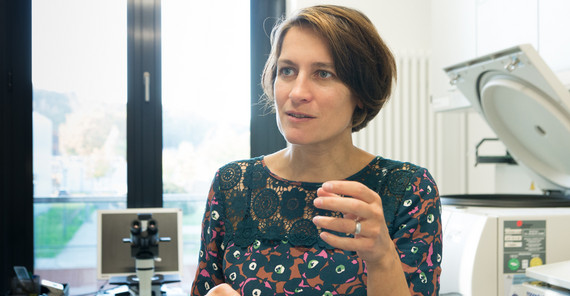They are the weapons of our body against unwanted invading microorganisms. Antibodies bind to the surface of viruses and bacteria. Specialized phagocytes are then able to recognize and eliminate them. Antibodies are also useful outside the body. In the pharmaceutical industry, the business with these tiny molecules is worth billions. They are used in diagnostics and increasingly also in treatments of various diseases. Endowment Professor Katja Hanack and her team are researching new methods for the production of antibodies.
Rheumatoid arthritis, colon cancer, macular degeneration, multiple sclerosis – the list is almost endless. Today, these and many other diseases can be treated with antibodies. The molecules that specifically bind to certain surface structures have become indispensable in medicine and life sciences. They are used to treat and diagnose diseases or to do blood tests for allergies and drug abuse. Even the pregnancy test is based on an antibody reaction. The need for these highly specific binding molecules is huge. However, the production is tedious, and often it does not meet the companies’ needs.
Antibodies should be produced faster, more efficiently, while taking into account animal welfare
Katja Hanack, Endowment Professor of Immunotechnology, is researching new methods that may revolutionize antibody production. “We are developing new strategies to simplify and optimize the whole method,” Hanack explains. The time factor is a crucial point. So far, it has taken six to eight months to produce an antibody. “We are now able to do it in two,” she says.
Another aspect is also important: “In the long run, we want to manage without a mouse.” Antibody production is mainly based on immune cells from the spleen or blood of animals - usually mice or rabbits that are killed to get the desired cells.
The team led by Prof. Hanack wants to change this. Mice or rabbits are to be replaced by cell lines in the future. “We are trying to replicate the system in the lab as it is in nature,” she says about the project. She takes the basic component of this plan from the air-conditioned culture cabinet in her laboratory. Invisible to the human eye, millions of blood stem cells float in a reddish nutrient solution at a constant temperature of 37°C in a flat culture dish. About 20 of these cultures are in the climate cabinet. The researchers’ goal is to build a complete artificial immune system from them. This process is special because it is a completely controlled process. The researchers will be able to verify the respective development stages of the system.
Immune cells have special needs
The complex structure of this system involves numerous cell types. They all need to feel comfortable in the artificial environment of Petri dishes and culture flasks. They all need to grow, divide, and be activated to fulfill their functions and eventually produce antibodies. This is a challenge for researchers and laboratory technicians. “We also test whether the precursors of the respective cells are suitable for our processes. Everything is quite time-consuming,” Hanack says. If everything works well, the researchers get the cells they want: highly specific cells in huge numbers that produce the desired antibodies to which they were previously programmed.
The researchers spare no effort towards this goal. “If the cell feels disturbed by anything, it will not work properly,” Hanack explains. In order to make the immune cells feel well, it does not only need the right nutrient medium and temperature; a little bit of comfort is also necessary. “We do our best to create a 'home' for them,” she says. “Such a cell culture plate is nice, but it is not like in vivo, i.e. in the organism.” To recreate the natural environment, the researchers want to model certain lymphatic gland structures that provide particularly good conditions for the growth of immune cells. They use a bioplotter to print two- and three-dimensional protein structures on the culture plates. Will the cells appreciate the architectural effort? “We hope so.”
The interests of the companies are central
Hanack does not need to look far for the practical relevance of her research. Her research team works closely with small and medium-sized local companies that develop antibody-based pharmaceutical or biotechnological products. She knows that companies depend on the fast and safe production of the required molecules. “If the antibody is not available, the product cannot be developed.”
And something else is important to companies: They want to buy antibodies that are immediately usable, under the given conditions of the laboratory environment. “Many of the mass-produced antibodies are not sufficiently validated,” Hanack describes the problem. The buffer solution, the detection system or the nutrient medium - these components must be individually adjusted to make the systems work well.
Hanack knows what she is talking about. In 2014, she and her colleague Pamela Holzlöhner founded the company “new/era/mabs,” which the two bioscientists use to transfer their research findings to the business sector. They use their expertise to produce and sell antibodies not only quickly but also precisely tailored for the customers.
THE PROJECT
“Pit goes Next” develops a platform for antibody production based on cell lines. The new technology will be able to produce antibodies faster, with precision tailoring and without animal experiments.
Funding: Federal Ministry of Education and Research within the InnoProfile Initiative
Duration: 2015-2019
www.uni-potsdam.de/ibb-immuntechnologie/startseite.html
THE RESEARCHER
Prof. Katja Hanack studied biology in Rostock and Berlin. She earned her doctorate at the University of Potsdam and was head of the InnoProfile junior research group “Antibody Technologies” from 2008 to 2014. Since 2015, she has been an Endowed Professor of Immunotechnology. The endowed chair is co-financed by the Federal Ministry of Education and Research and eight regional biotech companies.
katja.hanackuuni-potsdampde
Text: Heike Kampe
Translation: Susanne Voigt
Published online by: Alina Grünky
Contact to the online editorial office: onlineredaktionuuni-potsdampde

